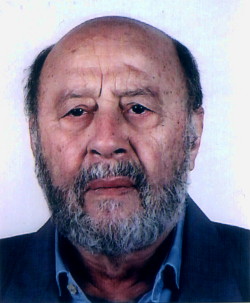Kader Mekki
I first heard about SCI from a friend in 1948 when I was a student at a Professional Trades School in Algiers. I was motivated by the idea of being able to have contact with others, that is not just the French, but foreigners like Swiss, Dutch, Germans. I wanted to get to know a bit more about life and things like that. In work camps the atmosphere was so calm; people were very friendly and sincere. Pierre Martin wasn’t there just then. I took part in weekend camps, especially in Béradi in the Algiers suburbs (see Nelly) where I did some painting work. We would unblock drains, and repair huts. The girls taught sewing and knitting.
I also did some camps in Kabylie during the holidays in 1949 and `50. In `49 I did a camp near Oued Aïcha not far from Tizi Ouzou, building a road through to the village. There were two German and two Swiss volunteers. I was the only Algerian. I had my head shaved, and several other volunteers followed suit. As we worked for nothing, and we had very frugal food, a lot of people took us for convicts who had been sent by the French to spy on the village! At that time it was difficult to explain to people who we were, and what we were doing.
In 1950 I was in charge of a camp at Rhba Routh (?). I was a bricklayer and a frame maker, and we made a catchment for a fountain. It was the first time I had done that kind of thing. We were helped by a British missionary who lived there, and he supplied us with all the necessary materials. We piped the water supply to just above the village, so that the womenfolk could easily fetch their water, rather than having to walk 4 or 5 kilometres for it. There were no village people available to work with us, as all the men had gone to France or elsewhere to find work, leaving only the women and children. Still, we had very good contact with the local people. In the autumn we went back to repair and redecorate the village school. Simone Chaumet was there, a marvellous girl, and a certain ‘Emile’ – they were always together. He was best man at our wedding, and we went to visit her on our honeymoon.
A little anecdote: one day it rained very heavily, and the next morning we picked loads of mushrooms which one of the volunteers cooked for us. Anyway, as our food was usually rather frugal we threw ourselves on them and thoroughly enjoyed them. Afterwards, everyone was as sick as dogs, all night long.
The Algerian branch tended to function in fits and starts. The secretaries only came for a limited period of time. Nelly for about a month, Willy Begert for a few months – Pierre Martin himself wasn’t there all the time. The others (Paul Lafon) used to come to give a hand, but their main jobs were elsewhere. On top of that, we were very much lacking in resources. Emile Tanner was only just able to make ends meet. I, myself, didn’t have enough experience to make a good secretary, and we didn’t have the wherewithal for me to live on.
After Independence, it wasn’t only SCI that was prevented from starting up again. Any organization outside the FLN wasn’t at all welcome. There was only the camp in Tlemcen which I visited in 1963, where they did a good job; but apart from that, the Algerian Authorities even regarded SCI with suspicion. Later, after Boumediene, it became even more difficult. I only once had contact with Touiza in the 80s, but they didn’t have sufficient resources either.
At the end of 1950 I became a long-term volunteer with SCI; first of all in Clichy with Etienne Reclus. I was in Nanterre with the Abbé Pierre in the first Emmaüs camp. We built a small shack for a family. We also constructed the first prefabricated house for the Castors. At Pigalle, where the Abbé Pierre was trying to rehabilitate prostitutes, we repaired apartments. It was most interesting.
Then I went on to Calabria in Southern Italy, for two and a half months. The camp, where we built a road to a village, was organized by the Italian branch. For me, it was a very unexpected experience - it was as if I was at home in Kabylie. The people were dark-skinned and wore a costume similar to a burnous, and they would bring their goods and produce to market, just like in Kabylie. We had problems with the local Catholic Church, which owned all the land around. From what I was told the Church preferred to let the fields lie fallow, and refused to help the common people who only had small plots of land.
Afterwards I went to Saint Pol de Léon in Britanny for three months where we worked with a building cooperative. Next, SCI sent me to England near Coventry where there was a centre for handicapped people; there we helped dig a swimming pool. From there I went to Norway near Oslo. We worked in the forest, planting trees for a big forestry company. I stayed there three months. The company paid us for our work, and whatever we were able to save we sent to SCI to finance a camp in India.
I went back to Algeria at the end of 1952, and I stood in as SCI secretary for a while, as no one else was available at the time. I stayed until Willy Begert arrived. I then took up a bricklaying job in order to earn my living, and make ends meet. I got married to a Norwegian volunteer, despite the opposition of the French authorities who told my wife “You are crazy, these people aren’t at all like us!” It was only after some stringpulling by someone connected with Concordia, that the Prefect gave us his permission to get married.
We went on holiday to Norway in 1954, but there was a terrible earthquake in Orléansville (Algeria), and SCI organized an emergency relief camp there. I left my job in Norway, and went to give a hand for a couple of weeks. There were several organizations involved. Where I was, there were only a dozen or so international volunteers, and some Algerians like Mohammed Sahnoun. It was a matter of clearing up but, above all, to encourage the local people. In fact we weren’t able to do very much else for them, even more so as the French Authorities didn’t want any interference from “those SCI snoopers”. In fact, we were barely tolerated by them, and they did everything possible to prevent us from doing anything that might help the people.
The Algerian national uprising started on 1st November 1954, and the French Authorities started waging war on anyone who could in any way be considered an activist. I was living with friends when the police came looking for me. My brother was already in prison. I left for Norway. I worked there, and studied engineering, but I continued to do camps during my holidays – I was often put in charge of them. I went on to work for firms in various countries.
Then I was employed by the Norwegian government: helping resistance movements in Southern Africa, with development projects in Yemen and Vietnam, and then for the French government in Angola and Mozambique. I have also worked for the UN High Commission for Refugees, with Norwegian aid for Palestinian refugees after the Arab – Israeli war of `67 and in the `80s for the World Council of Churches in Algeria.
With regards to the question of the effectiveness of SCI, one must first and foremost emphasize its general lack of resources. We could have done much more had we had adequate means to carry out our job. In due course, I was put in charge of projects involving millions of dollars, whereas with SCI we only counted in thousands. Moreover, the work of SCI was too fragmented: the work camps were only for short periods. Even when I was a long-term volunteer, now and then, I had to take a paid job for two or three months at a time, in order to earn enough pocket money so that I could do three months more voluntary service which hindered continuity. But having said that,-despite our limited resources, we did achieve a great deal.
The organizational problems that occurred were due to a lack of continuity. We were the pioneers of long-term voluntary service, even paying our own travel expenses; only our board and lodging were covered by the association.
Feelings of solidarity grew between us. We accepted each other as we were, bringing about deep friendships without reservations, which are still as strong today, fifty years later.
My experience with SCI has taught me how to listen to people and it has opened up new horizons to me.



